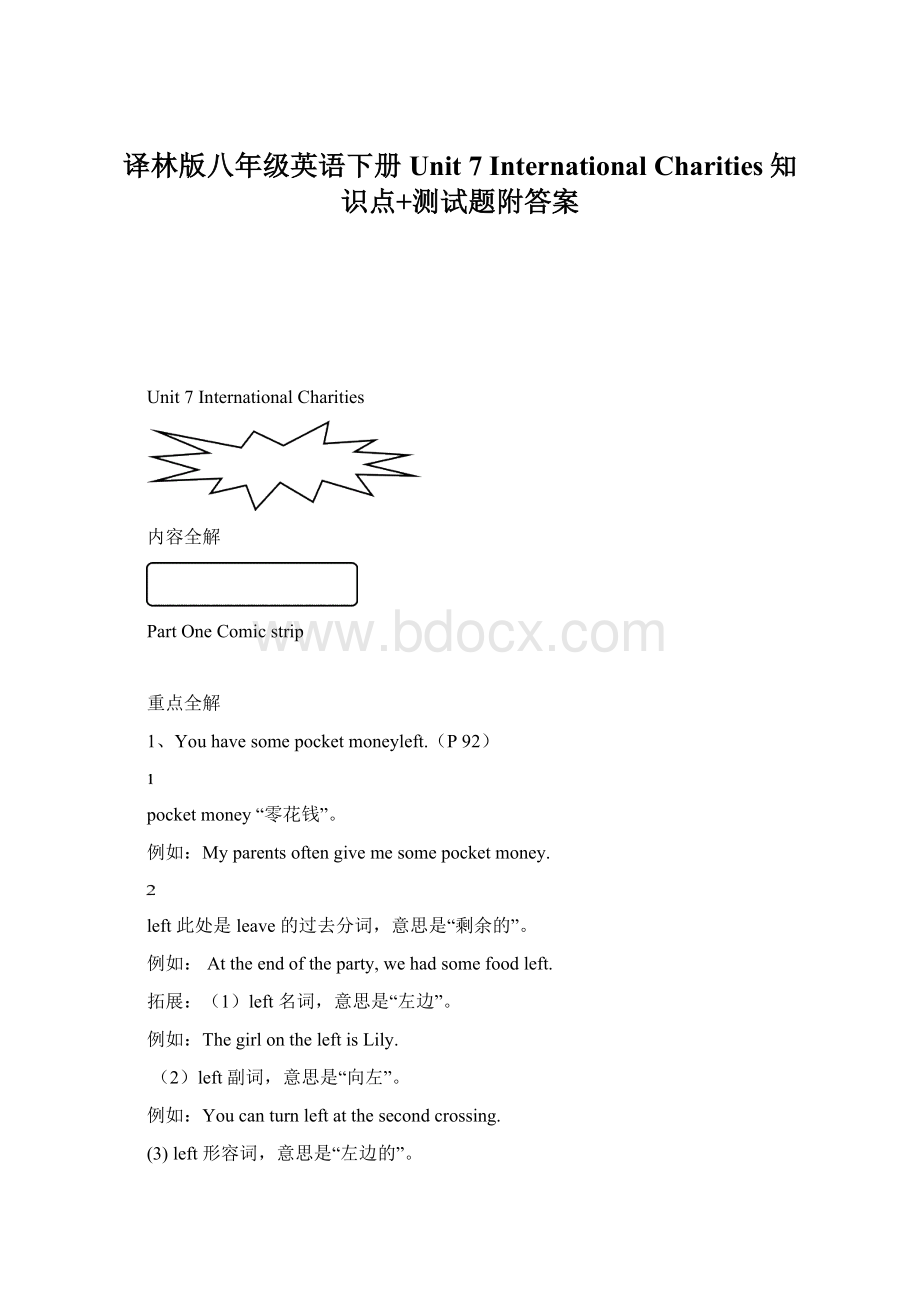译林版八年级英语下册Unit 7International Charities知识点+测试题附答案Word文档格式.docx
《译林版八年级英语下册Unit 7International Charities知识点+测试题附答案Word文档格式.docx》由会员分享,可在线阅读,更多相关《译林版八年级英语下册Unit 7International Charities知识点+测试题附答案Word文档格式.docx(27页珍藏版)》请在冰豆网上搜索。

too+形容词+to“太……以至于不能……”
Heistooyoungtocarrythatbox.
PartTwoWelcometotheunit
A
1.ORBIS(国际奥比斯组织)(P93)
2.Oxfam(<
英>
牛津饥荒救济委员会/乐施会)(P93)
3.UNICEF(UnitedNationsInternationalChildren'
sEmergencyFund联合国儿童基金会)(P93)
4.WWF(WorldWildlifeFund世界野生动物基金)(P93)
B
1、IknowaboutacharitycalledUNICEF.(P93)
1.knowabout表示“了解,知道”。
Doyouknowabouthim?
2.UNICEF(UnitedNationsInternationalChildren'
sEmergencyFund)
联合国儿童基金会
2、Ithelpsbuildabetterworldforeveryone,especiallychildrenallovertheworld.(P93)
1.helpsb.(to)dosth.“帮助某人做某事”;
helpsb.withsth.“帮助某人某事”。
Theboyhelpedtheoldwomantocrosstheroad.
Shealwayshelpshimwithhishomework.
2.especiallyadv.“尤其,特别”,是especial的副词形式;
especialadj.“特别的,特殊的”。
Iamespeciallybusyonthisweekends.
Thisisanespecialday.
3.allovertheworld=aroundtheworld全世界
Iwanttotravelaroundtheworld.
=Iwanttotravelallovertheworld.
3.Itprovidesbasiceducationforchildreninpoorareas.(P93)
1.basicadj.“基础的,基本的”。
Everyoneshouldgetbasicright.
2.education不可数名词“教育”。
Childrenmustgeteducation.
1.educatev.“教育;
培养”。
Educatesb.todosth.“教育某人做某事”。
Ittakespatiencetoeducatechildren.
Youshouldeducateyoursontobefriendlytoothers.
2.educatorn.“教育工作者;
教育家”。
TaoXingzhiisagreateducator.
4.Italsoworkstopreventthespreadofsomeseriousdiseases,likeAIDS,amongyoungpeople.(P93)
1.spreadv.“扩散;
分布;
展开”。
Wemustpreventthespreadofthiskindofillness.
Youshouldrealizetheimportanceofthespreadofeducation.
spread(spreadspread)既可以作及物动词,也可以作不及物动词,意思是“展开;
传播;
散布”。
Hespreadthemap.
Thenewswasspreadquickly.
PartThreeReading
1、DrMa,pleasetellussomethingaboutblindness.(P94)
blindness不可数名词“失明”。
Don’tgiveupyourdreambecauseofyourblindness.
blindness是形容词blind+后缀-ness构成的名词,类似的还有:
kindness和蔼illness疾病happiness快乐
richness富有sadness悲伤
2、…mostlyinpoorareas,andabout80percentofthesecasescanbepreventedorcured.(P94)
1.mostlyadv.“主要地;
大部分地;
多半地”。
IammostlyathomeonSundays.
Hewritestohisparentseveryweek,mostlyonSaturdays.
2.case可数名词“病例;
案例”。
Thisisacaseoffever.
3.cure及物动词“治愈;
矫正”。
Canyoucurethesickchild?
curesb.ofone’sillness“治好某人的疾病”。
Thespecialmedicinecuredhimofhisheadache.
3、However,manypeopledon’thavemoneyformedicaltreatment.(P94)
1.medicaladj.“医学的;
医疗的”。
Hismotherworksinamedicalcollege
2.treatment可用作可数名词,也可用作不可数名词,“治疗”。
Hehadtogiveupmedicaltreatmentbecauseheusedupallthemoney.
4、ORBISusesitsFlyingEyeHospitaltovisitpoorareas.(P94)
flyingadj.“飞的;
飞行的;
会飞的”。
Thereisastrangeflyingobjectinthesky.
5、Theplaneisalsousedasatrainingcentre.(P94)
beusedas…“被用作……..”.
Englishisusedasasecondlanguageinmanycountries.
1.beusedfor….“被用来”
Aknifeisusedforcuttingthings.
2.beusedby…“被…….使用”
Chineseisusedbymoreandmoreforeigners.
3.beusedin…“被用于……方面”
Ihopethatthemoneyisusedinmedicalresearch.
6、Manyofourpatientscan’taffordtogotohospital…(P94)
1.afford及物动词“买得起;
能做;
承担得起”,后面接名词、代词或动词不定式做宾语。
ThehouseissoexpensivethatIcan’taffordit.
Shecan’taffordtopayforherdaughter’seducation.
口诀:
巧记afford的用法:
动词afford表“承担”,用法特殊记心间。
can,could,beableto,三个“能”字在其前。
疑问否定常出现,被动结构就免谈。
2.gotohospital去看病
gotothehospital去医院(看病人或做其他事)
7、Also,localdoctorsandnursesareinvitedonboardtolearnabouteyeoperations.(P94)
onboard“在飞机(船、火车)上”
Allthesailorshavebeenonboard.
Whenyouareonboard,youshouldturnoffyourmobilephone.
8、Duringmylastvisit,150patientswereoperatedon.(P95)
1.patient在句中用作可数名词,“病人,患者”
Thesepatientsarewaitingforthedoctortocome.
一言辨义:
Asadoctor,youshouldbepatientwithallthepatients.
operate不及物动词,“开刀,做手术”,“给某人做手术”应用operateonsb.表示
Thedoctorisoperatingonhim.
operate“操作;
开动(机器等)”
Hisfatherisoperatingthemachine.
9、I’mproudtohelppeopleseeagainandimprovetheirlives.(P95)
Proudadj.“自豪的,骄傲的”。
常见的短语如下:
1.beproudtodosth.“以做某事而骄傲”
Alltheplayersareproudtoplayfortheirmotherland.
2.beproudof…“为……..而自豪”
Theyareproudoftheirson.
3.beproudthat+从句,………很自豪…….
IamproudthatIhavefinishedtheworksuccessfully.
takepridein…与beproudof…同义“为……..而自豪”
Doyoutakeprideinyourjob?
10、Isthereanythingelseyou’dliketosaytoourreaders?
(P95)
1.anything不定代词,“某物,某件事”,用于表示物,若作主语,谓语动词用单数形式。
anything常用于否定句或疑问句中,若用于肯定句,意思则为“任何事”。
Idon’thaveanythingtodo.
Ifyouhaveanythingtotellme,youcangivemeacall.
1.something不定代词,“某事或某物”,常用于肯定句,也可用于表示请求、邀请、建议等语气的疑问句中。
Thereissomethingwrongwithhisbike.
Wouldyoulikesomethingtoeat?
2.nothing不定代词,“没有物,没有事”,常用于否定句中
Ioftenhavenothingtodointheevening.
2.reader可数名词,“读者”,是由“及物动词+后缀-er”构成的名词,通常表示做该动作的人,类似的还有:
player(运动员),writer(作家),teacher(教师),worker(工人),waiter(服务员)等;
但是有一部分是加后缀-or构成的,如:
actor(演员),collector(收藏者),educator(教育家),visitor(参观者)。
11、Modernmedicineisdevelopingquicklyandnowmosteyeproblemsanddiseasescanbetreatedandcured.(P95)
1.medicine用作不可数名词,“医学;
药”。
“服药;
吃药;
喝药”应用takethemedicine表示,而不用eatthemedicine或drinkthemedicine表示。
Chinesemedicineisverypopularinwesterncountriesnow.
Youmusttakethemedicinethreetimesaday.
2.develop可用作及物动词或不及物动词,“发展;
加强”。
ModernmusicwasfirstdevelopedinItaly.
Youshoulddevelopyourmindfully.
development可用作可数名词或不可数名词,“发展;
进展;
发达;
发育”;
developing“发展中的”,developed“发达的”。
3.treat及物动词,“治疗”
Thedoctoristreatinghimforhisillness.
treat用作及物动词,“对待;
看待;
把……看作”,treat….as…”把……看作…..”
Don’ttreatmeasachild.
辨析:
treat与cure
treat
宾语是人、某种疾病或发病的部位,强调治疗的过程,指对病人进行诊断和治疗,但不含治好的意思
Thedentististreatingmyteeth.
牙科医生正在给我看牙。
cure
宾语可以是人,也可以是某种疾病,强调治疗的结果,指治愈某种疾病或某人的疾病
Thismedicinewillcureyourtoothache.
这种药课治好你的牙疼。
Iwilltrymybesttotreathim,butI’mnotsurewhetherIcancurehim.
12.Butmoremoneyisneededtocarryonwithourwork.(P95)
carryonwithsth.“继续做某事”,相当于carryondoingsth.,goondoingsth.或continuedoingsth.
Let’scarryonwiththework.
PartFourGrammar
1、Leaflets.传单(P99)
Leaflet可数名词,“传单;
散页印刷品“
Theyaregivingoutleaflets.
2、Handout.分发。
(P99)
handout“分发;
发出”;
其反义词组为handin,”上交”。
Iamhelpingtheteacherhandouttheexaminationpapers.
Youmusthandinyourhomeworkbeforeclass.
注意:
短语handout与handin的宾语如果是名词,可放在短语中间或者后面;
如果宾语是人称代词,只能放在短语的中间。
Theteacherhandedthemouttothestudents.
Pleasehanditin.
3、hold(举行)(P100)
hold及物动词,“举行“。
过去式:
held,过去分词:
held
Ourschoolwillholdthesportsmeetingnextweek.
The29thOlympicGameswereheldinBeijingin2008.
hold作及物动词,还有以下含义:
1.“容纳“
Theclassroomcanholdover100students.
2.”握住;
抓住“
Hewasholdinghisfather’shand.
4.Oxfam
(1)wassetupintheUKin1942…(P100)
set(setset)既是及物动词,又是不及物动词,“创建,建立”,setup在此意为“建立”
Theschoolwassetupin1999.
setup还有“搭建;
建起”的意思。
Let’ssetupthetentfirst.
setup的宾语如果是代词,只能将其放在setup的中间;
如果是名词,可以放在setup的中间,也可以放在setup的后面。
5、Nowithasabout15,000shopsallovertheworld.(P100)
15,000读作“fifteenthousand””一万五千”。
英语中的基数词的读法要注意以下几点:
1.百位数与十位数之间要加and连接。
101读作:
onehundredandone
310读作:
threehundredandten
2.千位数以上的,从右向左数,每三位数用逗号隔开,第一个逗点为thousand,第二个逗点为million。
10,000“一万“,读作:
”tenthousand“
100,000“十万”,读作:
”onehundredthousand”
1,000,000“一百万”,读作:
“onemillion“
10,000,000“一千万”,读作:
“tenmillion“
100,000,000“一亿”,读作:
“onehundredmillion“
6、Withitshelp,millionsofpoorchildrenalloverthecountryweregivenbasiceducation.(P100)
withone’shelp“在某人的帮助下”=withthehelpofsb.,其反义短语为withoutone’shelp
Ifoundthebankwithhishelp.
Ican’tfinishtheworkwithoutyourhelp.
被动语态
(1)
被动语态的一般现在时和一般过去时
英语中的语态有两种:
主动语态和被动语态。
1.当主语是谓语的执行者时,用主动语态。
当主语是谓语的承受者时,用被动语态。
例如:
Wecleantheclassroomeveryday.
我们每天都打扫教室。
Theclassroomiscleaned(byus)everyday.
教室每题都被(我们)打扫。
2.被动语态的基本构成:
主语
be动词
过去分词
一般现在时
I
am
supported
You/We/They
is
He/She/It
are
一般过去时
was
were
3.被动语态的基本用法:
1.动作的执行者是泛指或不言自明时。
Noneofthebookswastakenaway.没有一本书被拿走。
2.在不知道动作的执行者是谁时。
Thetoyisdesignedforchildren.
这款玩具是为孩子们设计的。
3.需要强调动作的承受者时。
Mybikewasrepaired.我的自行车修好了。
4.出于委婉或礼貌而避谈动作的执行者时。
Thisproblemwastalkedaboutjustnow.
这个问题刚才被讨论过了。
5.在被动语态的句子中,如果我们需要指出动作的执行者,可以由by引出。
Mr.Wuislikedbyallofhisstudents.
所有的学生都喜欢吴老师。
有些动词常用被动语态。
HewasborninNanjing.他生于南京。
ThismobilephonewasmadeinChina.
这部手机是中国制造的。
4.主动语态与被动语态的句式转化:
主动语态
She
谓语(主动式)
hurt
宾语
me